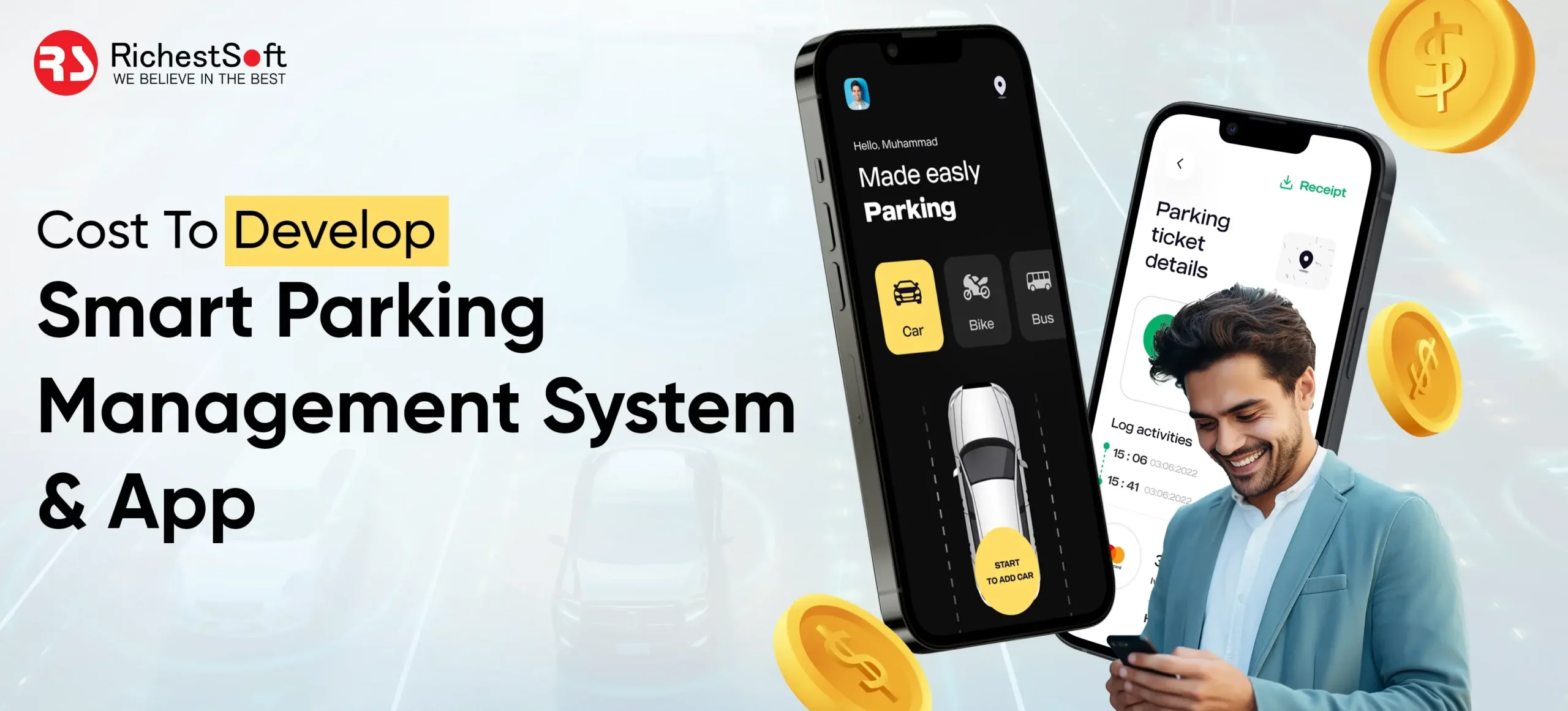October 22, 2024
With growing urbanization, having a car is very common for every household, leading to rising demand for parking spaces where the vehicle can be safely parked.
With this continuously developing urban sector, the problem of effective parking management has grown more pressing in today’s rapidly urbanizing cities.
Finding a parking spot has become a major cause of annoyance for drivers as cities become denser and the number of vehicles on the road keeps rising.
This has led to traffic congestion and higher pollution. Utilizing technology to maximize parking resource use and improve the entire parking experience, smart parking management systems have emerged as a possible answer to this problem.
At RichestSoft, we recognize that creating an app and smart parking management system represents a substantial investment in future cities’ efficiency and mobility.

Our team of highly skilled mobile app developers with a wealth of experience in developing innovative parking solutions that revolutionize how parking resources are managed by cities and how much it costs to develop an app for smart parking solutions.

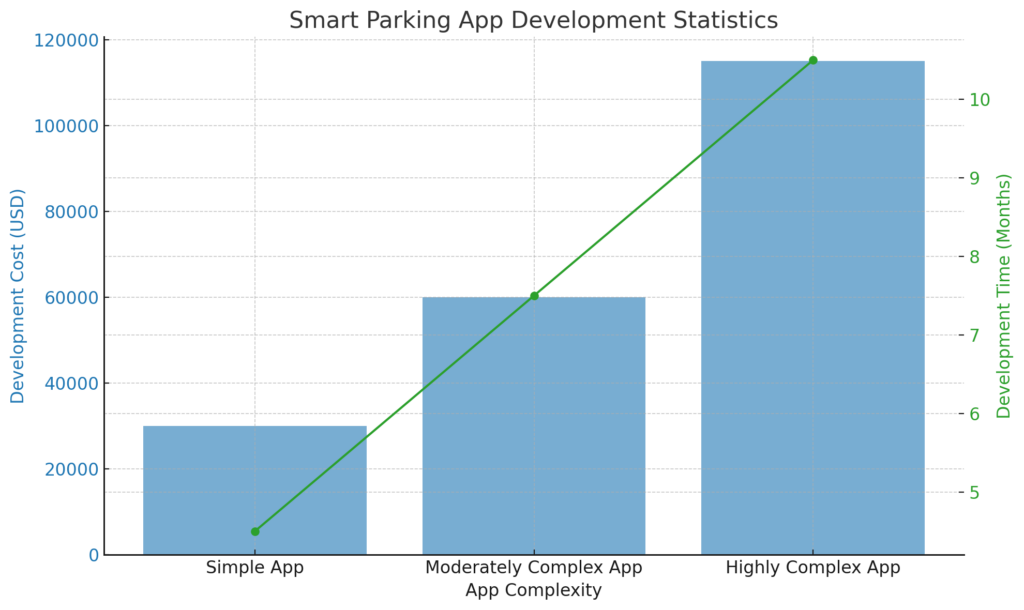
Understanding How Smart Parking System Works?
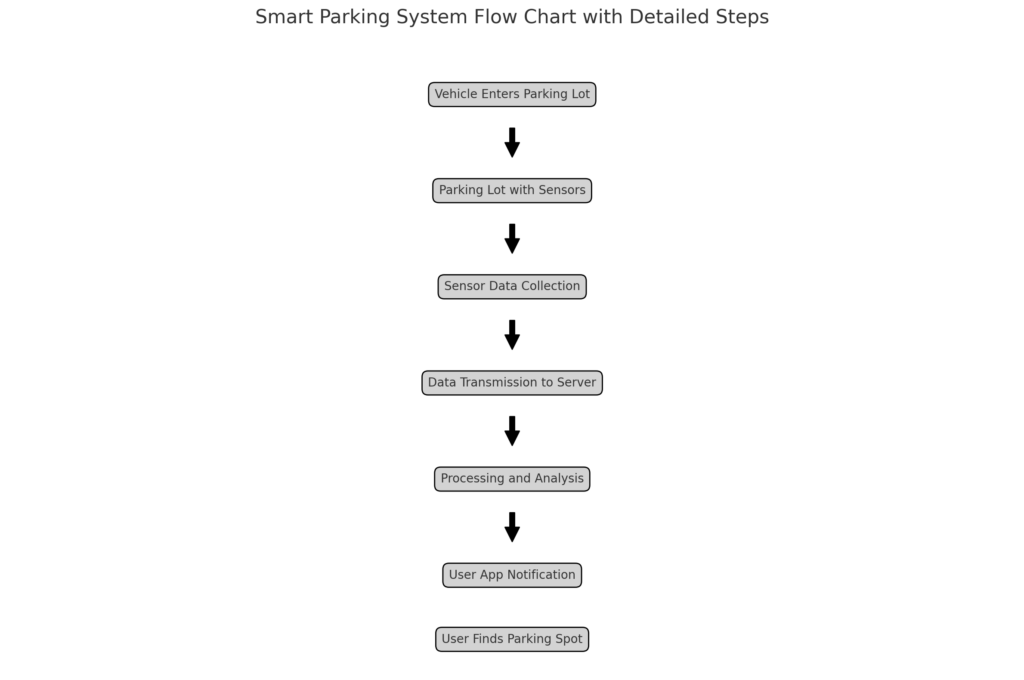
A smart parking management system typically integrates advanced software applications with hardware components such as cameras and sensors.
This combination provides real-time parking availability information, facilitates smooth payment processing, and offers insightful data to parking operators and city planners.
By eliminating unnecessary car circulation, these systems can significantly reduce the time spent searching for parking spaces, improve traffic flow, and create more sustainable urban environments.
However, as with parking IoT technology solutions, creating and implementing a smart parking management system involves expenses.
These costs can differ significantly depending on the system’s size and complexity, the particular features needed, and the technology strategy selected.
How Much Does A Smart Parking System Cost?
Building a smart car parking app can range between $30k – $120k on average.
Still, the actual smart parking system cost can vary based on the technologies you want to integrate such as AI integration services, features you’ll add, and many other factors, which we’ll discuss later.
Let’s now look at the average cost estimates of every element in building a car parking app.
| Development Process | Cost Estimation |
| Planning and Prototyping | $2000-$5000 |
| Tech Stack | $8000-$25000 |
| UI/UX Design | $7000-$16000 |
| Development | $6500-$18000 |
| Testing And Deployment | $5000-$17000 |
| Launch To Market | $3000-$9000 |
You must consider these average estimates of the costs of developing a smart parking app like SpotHero.
Let’s examine some other factors, like region or technology integrations, that may affect the overall development cost.
Parking Management App Cost (Based on Manpower In Different Regions)
Parking management software costs vary greatly based on the development team’s location.
This variation is mostly caused by disparities in labor prices and living conditions worldwide.
Here’s an overview of the estimated hourly rates for software developers in various regions:
| Region | Manpower Rate (Per Hour) | Total Cost Estimate |
| USA | $100 – $250 | $50,000 – $125,000 |
| Canada | $90 – $200 | $30,000 – $100,000 |
| UK | $28 to $60 | $25,000 – $85,000 |
| India | $20 – $80 | $10,000 – $40,000 |
| Europe (Eastern) | $40 – $100 | $20,000 – $50,000 |
| Europe (Western) | $80 – $200 | $40,000 – $100,000 |
| Southeast Asia | $25 – $100 | $12,500 – $50,000 |
Parking Management App Cost (Based on Technology Integrations)
While developing your smart parking management app, consider the technologies necessary for your target market and long-term objectives.
Adding more sophisticated features gradually after completing key functions might help control expenses without sacrificing user experience.
The technologies used in the system can substantially impact the parking management solution cost.
Below is a summary of how various technological integrations can affect the total cost:
| Technology Integrations | Estimated Cost |
| AI Chatbot and Machine Learning | $30,000 – $70,000 |
| Blockchain Development | $25,000 – $50,000 |
| Augmented Reality Features | $20,000 – $40,000 |
| Digital Wallet/Multiple Payments Integration | $10,000 – $25,000 |
| Ticketless Parking Systems | $15,000 – $30,000 |
| GPS Tracking | $5,000 – $15,000 |
| IoT Sensors | $20,000 – $50,000 |
These costs are only estimations that may change depending on the project’s size, the application development team experience, and the integration’s complexity.
It’s crucial to remember that certain integrations can also have continuous maintenance, data processing, or third-party service charges.
Key Features To Be Included In A Smart Parking App Development
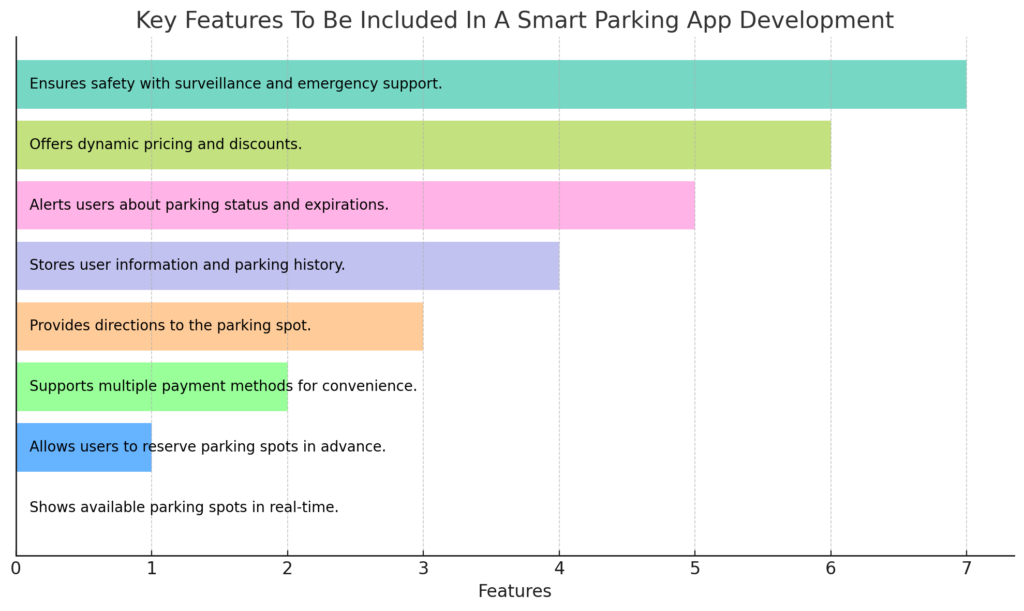
A well-designed smart parking app can greatly improve users’ parking experiences when combined with useful features for parking operators.
These are the main characteristics of a thorough, smart parking software commonly integrated:
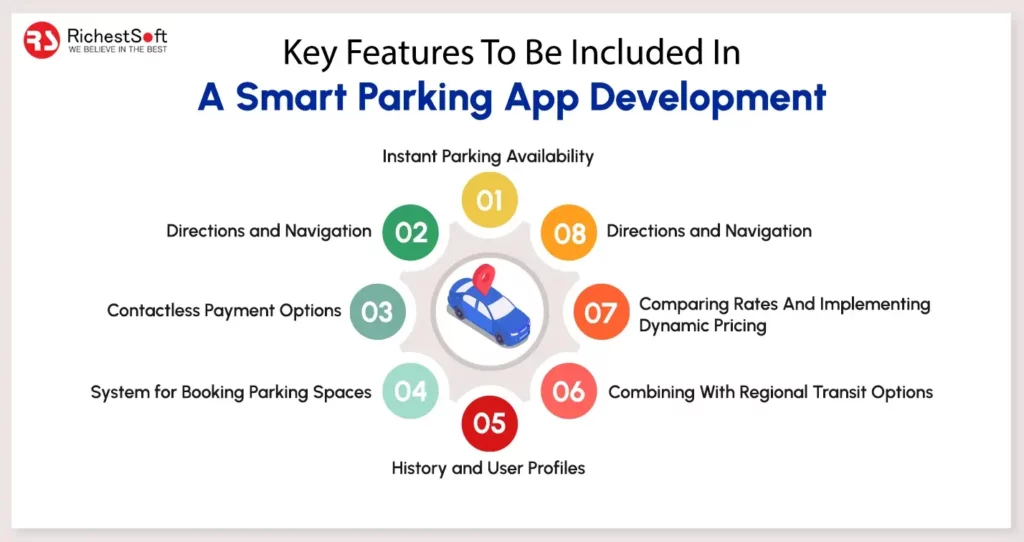
1. Instant Parking Availability
This service lets users get the most recent information about available parking spots. Typically, sensors or other Internet of Things devices identify occupancy and send data to the app.
By pointing customers toward available places, real-time availability saves customers time and annoyance and maximizes parking space utilization for operators.
2. Directions and Navigation
Users are guided straight to their selected parking spot via integrated GPS navigation. This function frequently includes turn-by-turn directions, particularly helpful in big parking lots and strange places.
A sophisticated parking app might also include built-in navigation to help customers find their parking space accurately.
3. Contactless Payment Options
Nowadays, parking apps usually provide several digital payment options, eliminating the need for cash or paper tickets. This can include digital wallets, credit card processing, and, in certain situations, cryptocurrency.
Contactless payment methods improve user convenience and simplify parking operators’ revenue-collecting procedures.
4. System for Booking Parking Spaces
Users can reserve parking spaces in advance through a reservation system. This feature might make drivers feel more at ease, especially in busy locations or rush hours.
The system may offer opportunities to pick preferred parking spaces inside a facility or even particular time slots.
5. History and User Profiles
Personal user accounts can store parking history, payment preferences, and car information.
This feature improves the customer experience by facilitating speedy reservations and simple access to previous transactions.
Moreover, customized discounts and loyalty schemes are supported.
6. Reminders and Notifications
Users can avoid potential fines and overstaying by using automated alerts that inform them when parking expires.
Additionally, users can receive reminders for recurrent reservations or ask to extend their parking time when necessary.
7. Comparing Rates And Implementing Dynamic Pricing
Some apps let users compare parking prices at various sites to see the most economical ones.
Operators can maximize revenue by offering bargains to users during off-peak hours, and dynamic pricing capabilities can modify rates based on demand, time of day, or special events.
8. Combining With Regional Transit Options
More sophisticated parking apps can connect to ride-hailing services, bike-sharing programs, and public transportation information.
By assisting users in planning their complete trip rather than simply parking, this feature promotes a more all-encompassing approach to urban mobility.
Use Cases Of A Smart Parking Management App Development
Smart parking apps cater to various industries and scenarios. Here are some key use cases:
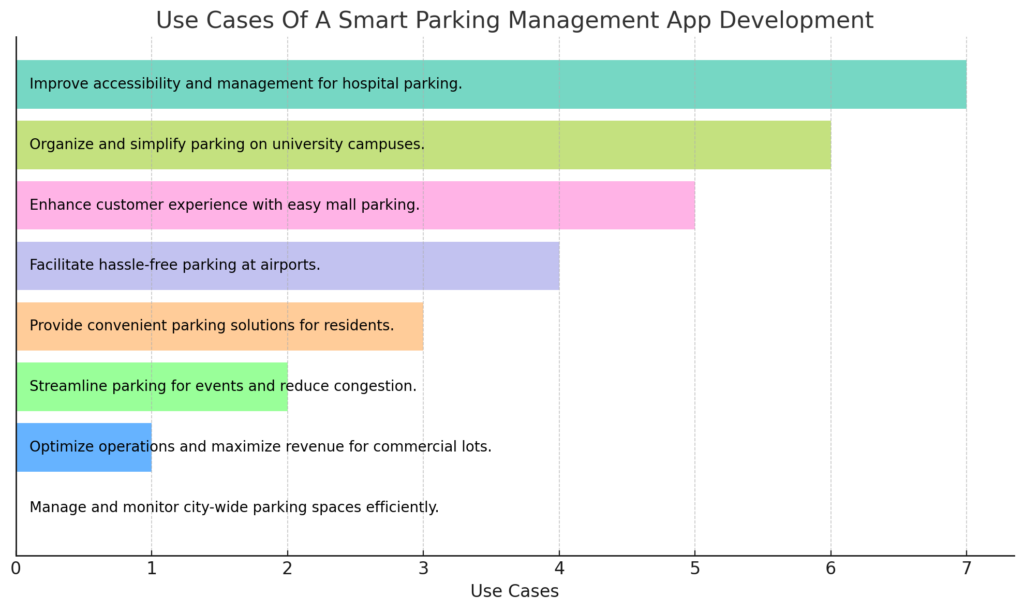
🗹 Urban Commuters
Using the app, daily commuters in crowded cities can locate and reserve parking spaces close to their place of employment. This saves time, decreases stress, and helps the workweek start smoothly. The app can make customized recommendations and recall frequently visited sites based on the user’s habits.
🗹 Event Attendees
Parking spots can be reserved in advance for conferences, sporting events, and concerts. This reduces the stress of finding parking in congested places and allows attendees to enjoy the event instead of wandering around looking for a spot.
🗹 Malls and Shopping Centers
Retailers can utilize the app to locate parking spaces at sizable retail centers. Certain apps may have integrations with mall directories, enabling users to park near the restaurants or stores they want to visit.
🗹 Travelers To Airports
Utilizing smart parking applications can make long-term parking at airports easier. Consumers may schedule parking in advance, compare prices, and even get reminders about where to park when they return from their trip.
🗹 City Visitors and Tourists
Travelers unfamiliar with the parking laws and locations in the area can use the app to identify authorized parking spaces, navigate new city centers, and stay out of trouble for parking.
🗹 Parking Operators
From a management perspective, operators use these apps to collect useful data on parking trends and customer behavior, optimize space use, and apply dynamic pricing.
🗹 Local Businesses
Small businesses in crowded urban locations should collaborate with parking apps to provide their clients with validated or cheap parking, potentially boosting foot traffic and sales.
🗹 Municipal Governments
Information gathered from parking applications can help cities better understand traffic patterns, modify parking regulations, and make better judgments about parking infrastructure in urban planning.
🗹 Owners of Electric Vehicles
EV owners can find parking spaces with charging stations using specialized features that enable them to charge their cars while parked.
🗹 Accessibility Users
To guarantee they have the right accommodations when they arrive, people with disabilities can use the app to find and reserve accessible parking spaces.
Top Benefits Of Smart Parking App Development
There are several benefits for users and parking operators alike when developing smart parking apps. The principal advantages are as follows:
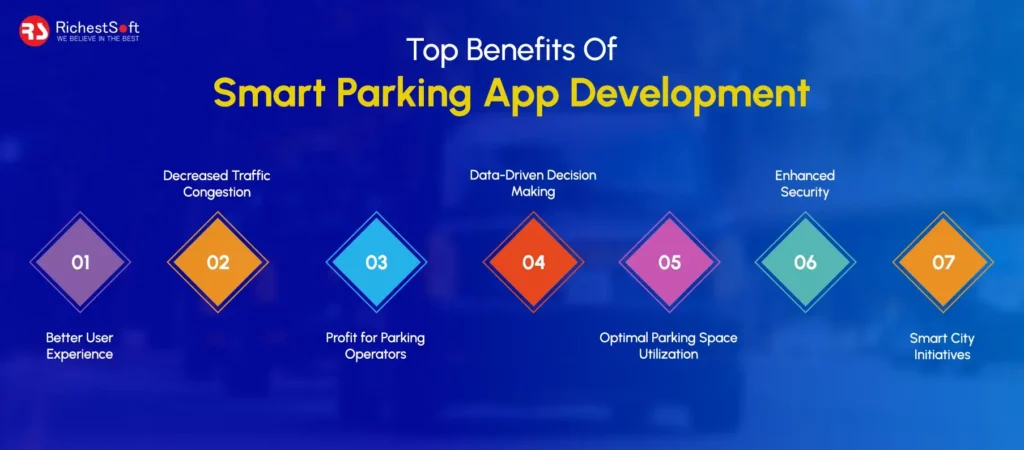
➧ Better User Experience
Smart parking apps greatly reduce the time and frustration involved in finding parking. Users can easily see open locations through their iPhones, reserve them in advance, and make payments. This improved convenience results in higher client satisfaction and loyalty.
➧ Decreased Traffic Congestion
Traffic congestion has decreased noticeably due to cars spending less time searching for parking. This supports attempts to maintain environmental sustainability by reducing emissions and fuel consumption while improving urban traffic flow.
➧ Profit for Parking Operators
Smart parking systems can implement dynamic pricing models that adapt rates to availability and demand. Because of this flexibility, operators can charge more competitively during off-peak hours to draw in more customers while maximizing their revenue during peak hours.
➧ Data-Driven Decision Making
Data gathered by smart parking apps can provide information about parking patterns, peak usage periods, and user preferences. This data can help optimize parking regulations, direct urban planning decisions, and advise upcoming infrastructure expenditures.
➧ Optimal Parking Space Utilization
These apps help distribute cars more equitably across available spaces by offering real-time data on parking availability. This optimization can raise parking facilities’ overall capacity without requiring physical extension.
➧ Enhanced Security
Digital payment records and automated car recognition are just two benefits that many smart parking apps offer. By lowering the possibility of theft and offering a transparent record of parking transactions, these features improve security for both users and operators.
➧ Smart City Initiatives
Parking apps can be vital parts of larger smart city ecosystems. They can be integrated with other urban services, such as city information systems or apps for public transit, making the urban environment more efficient and linked.
Conclusion
Developing smart parking apps is a huge step in parking management and urban mobility. These apps offer numerous advantages.
Additionally, incorporating technologies expands the possibilities for parking solutions and opens doors to more effective, user-friendly, and sustainable urban settings.
The possible return on investment is significant, even if the expenses of creating a smart parking app vary greatly depending on technological features and the cost of AI integration.
We at RichestSoft are leading the way in creating smart parking solutions.
With the help of our team of skilled iOS app developers and Android app developers and urban technology specialists, your parking management idea can become a reality.
Don’t let parking issues hinder your business. Contact RichestSoft now for a free consultation.

 +1 315 210 4488
+1 315 210 4488 +91 99888 06489
+91 99888 06489